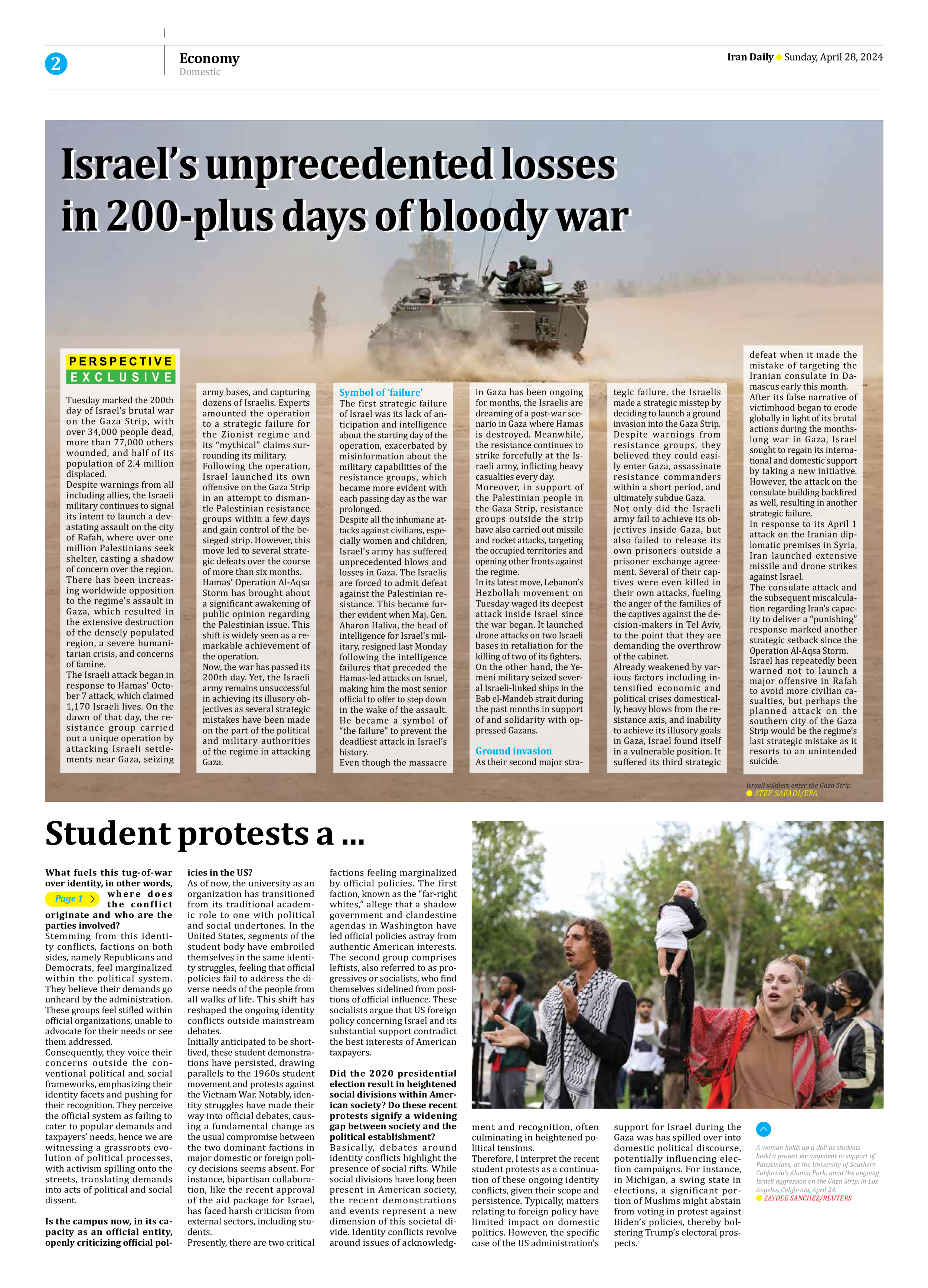
Israel’s unprecedented losses in 200-plus days of bloody war
Tuesday marked the 200th day of Israel’s brutal war on the Gaza Strip, with over 34,000 people dead, more than 77,000 others wounded, and half of its population of 2.4 million displaced.
Despite warnings from all including allies, the Israeli military continues to signal its intent to launch a devastating assault on the city of Rafah, where over one million Palestinians seek shelter, casting a shadow of concern over the region.
There has been increasing worldwide opposition to the regime’s assault in Gaza, which resulted in the extensive destruction of the densely populated region, a severe humanitarian crisis, and concerns of famine.
The Israeli attack began in response to Hamas’ October 7 attack, which claimed 1,170 Israeli lives. On the dawn of that day, the resistance group carried out a unique operation by attacking Israeli settlements near Gaza, seizing army bases, and capturing dozens of Israelis. Experts amounted the operation to a strategic failure for the Zionist regime and its “mythical” claims surrounding its military.
Following the operation, Israel launched its own offensive on the Gaza Strip in an attempt to dismantle Palestinian resistance groups within a few days and gain control of the besieged strip. However, this move led to several strategic defeats over the course of more than six months.
Hamas’ Operation Al-Aqsa Storm has brought about a significant awakening of public opinion regarding the Palestinian issue. This shift is widely seen as a remarkable achievement of the operation.
Now, the war has passed its 200th day. Yet, the Israeli army remains unsuccessful in achieving its illusory objectives as several strategic mistakes have been made on the part of the political and military authorities of the regime in attacking Gaza.
Symbol of ‘failure’
The first strategic failure of Israel was its lack of anticipation and intelligence about the starting day of the operation, exacerbated by misinformation about the military capabilities of the resistance groups, which became more evident with each passing day as the war prolonged.
Despite all the inhumane attacks against civilians, especially women and children, Israel’s army has suffered unprecedented blows and losses in Gaza. The Israelis are forced to admit defeat against the Palestinian resistance. This became further evident when Maj. Gen. Aharon Haliva, the head of intelligence for Israel’s military, resigned last Monday following the intelligence failures that preceded the Hamas-led attacks on Israel, making him the most senior official to offer to step down in the wake of the assault. He became a symbol of “the failure” to prevent the deadliest attack in Israel’s history.
Even though the massacre in Gaza has been ongoing for months, the Israelis are dreaming of a post-war scenario in Gaza where Hamas is destroyed. Meanwhile, the resistance continues to strike forcefully at the Israeli army, inflicting heavy casualties every day.
Moreover, in support of the Palestinian people in the Gaza Strip, resistance groups outside the strip have also carried out missile and rocket attacks, targeting the occupied territories and opening other fronts against the regime.
In its latest move, Lebanon’s Hezbollah movement on Tuesday waged its deepest attack inside Israel since the war began. It launched drone attacks on two Israeli bases in retaliation for the killing of two of its fighters.
On the other hand, the Yemeni military seized several Israeli-linked ships in the Bab el-Mandeb strait during the past months in support of and solidarity with oppressed Gazans.
Ground invasion
As their second major strategic failure, the Israelis made a strategic misstep by deciding to launch a ground invasion into the Gaza Strip. Despite warnings from resistance groups, they believed they could easily enter Gaza, assassinate resistance commanders within a short period, and ultimately subdue Gaza.
Not only did the Israeli army fail to achieve its objectives inside Gaza, but also failed to release its own prisoners outside a prisoner exchange agreement. Several of their captives were even killed in their own attacks, fueling the anger of the families of the captives against the decision-makers in Tel Aviv, to the point that they are demanding the overthrow of the cabinet.
Already weakened by various factors including intensified economic and political crises domestically, heavy blows from the resistance axis, and inability to achieve its illusory goals in Gaza, Israel found itself in a vulnerable position. It suffered its third strategic defeat when it made the mistake of targeting the Iranian consulate in Damascus early this month.
After its false narrative of victimhood began to erode globally in light of its brutal actions during the months-long war in Gaza, Israel sought to regain its international and domestic support by taking a new initiative. However, the attack on the consulate building backfired as well, resulting in another strategic failure.
In response to its April 1 attack on the Iranian diplomatic premises in Syria, Iran launched extensive missile and drone strikes against Israel.
The consulate attack and the subsequent miscalculation regarding Iran’s capacity to deliver a “punishing” response marked another strategic setback since the Operation Al-Aqsa Storm.
Israel has repeatedly been warned not to launch a major offensive in Rafah to avoid more civilian casualties, but perhaps the planned attack on the southern city of the Gaza Strip would be the regime’s last strategic mistake as it resorts to an unintended suicide.







